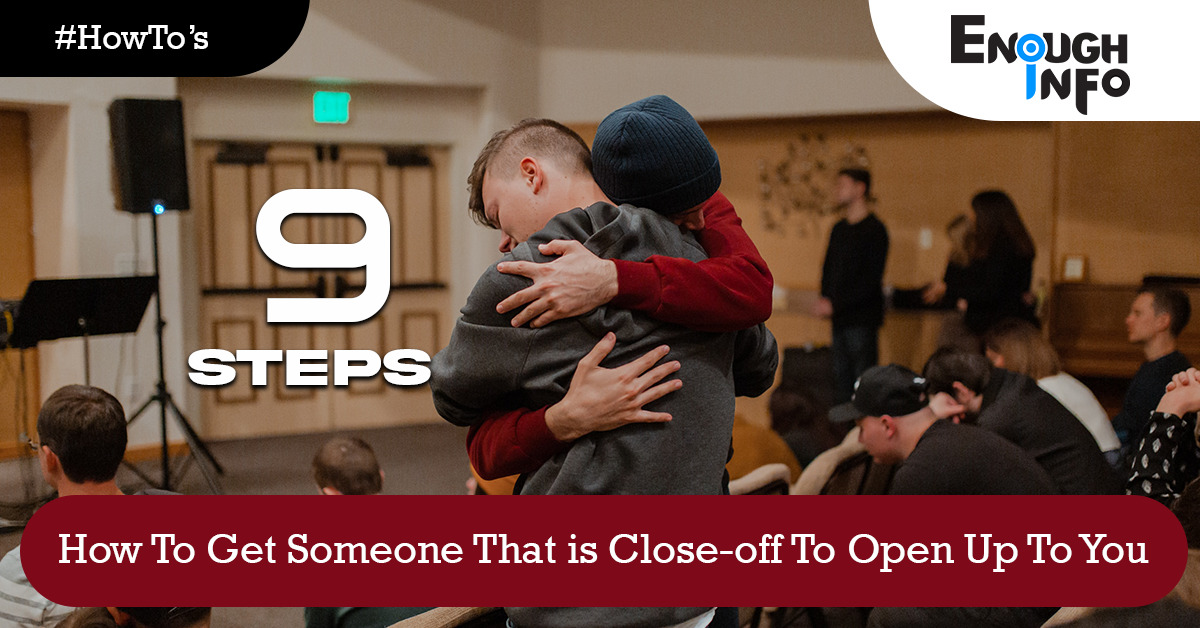How To Get Someone That is Close-off To Open Up To You

How To Get Someone That is Close-off To Open Up To You: The success of every relationship, especially romantic ones, depends greatly on open and honest communication. However, some individuals are not always inclined to express their emotions to friends, family, or even their spouse. Keep scrolling. EnoughInfo.com

It might be unpleasant and disappointing if your significant other is guarded and unwilling to open up to you, but there are things you can do to motivate them to do so. Here are a few reasons why someone could be guarded and suggestions for getting them to open up .By taking the suggested actions, you may foster an atmosphere where individuals feel at ease enough to be open and honest. 14 Essential Steps For Optimizing A Website For Mobile
Read Also: How To End A Relationship The Right Way
FAQs & Answers on Getting Someone That is Close-off To Open Up To You
1. Can I make someone feel safe and at ease so they will open up to me?
Yes, you may give someone a sense of security and comfort by getting them to open up to you. Creating a welcoming and pleasant environment might make the other person feel more at ease. Pose inquiries that invite people to express their thoughts, ideas, or experiences. The other person might feel comfortable being vulnerable with you if you are honest and empathetic of their situation. Finally, allowing the other person to be honest with themselves and with you will be made possible by your patience and lack of judgment. Health Benefits Of Pomegranates (Step By Step)
2. How can I get them to talk about their feelings and thoughts?
Active listening can help to encourage someone to express their feelings and opinions. Ask them how they are feeling and give them your undivided attention. How did it make you feel? What do you think about that? Are some more open-ended questions you might ask? Allow the person to speak in peace and quiet. Tell them it’s okay to bring up sensitive or challenging topics. By maintaining eye contact and reacting with empathy, you might convey that you are interested in what they have to say. Assure the speaker that their opinions are welcome and will be taken into consideration without bias.
3. How can I get my kid to talk to me?
Give your youngster your undivided attention. Show your youngster that you understand them by listening to them with an open heart and head.
Read Also: How To Talk To Children
How To Get Someone That is Close-off To Open Up To You

1. Create a safe, non-judgmental environment
Start by making sure that your communication is non-judgmental and that trust is established between the two of you. Be clear as to why you are asking for someone to open up and eliminate any possible triggers that could cause them to become uncomfortable or resist sharing their thoughts and feelings.
2. Consistency is key
It’s crucial to be consistent to foster trust if your spouse is struggling with any of the aforementioned issues, whether it’s prior marital trauma or a lack of emotional processing. It usually takes longer for people with strong boundaries and difficulty opening up to establish rapport and a sense of emotional safety. That foundation may be strengthened by keeping your word, calling when you say you will, and other such actions.
3. Practice active listening
We all have a strong want to feel noticed and understood, even if someone finds it difficult to express themselves. By providing the safe space they require, active listening is a terrific way to reassure your spouse that you are there for them. Empathy is the most crucial element of active listening: spoken admission of one’s sentiments without judgment. This may be done by using language like, “It seems like you’re feeling [insert acceptable feeling] because [reason they could be feeling that way],” which invites their opinion.
4. Demonstrate sharing and self-disclosure
Self-disclosure is another great strategy for getting someone to open up without taking over the conversation and making it about you. She advises crafting sharing and self-disclosure statements so that they compel the recipient to share their experience. As in, “I’ve been battling a lot with social withdrawal and am feeling quite lonely and concerned about it. How are you doing these days? They’ll be less likely to feel disregarded or silenced if you include them in your own vulnerability.
Read Also: How To Practice Self Care(All You Need to Know)
3. Utilize nonverbal cues
Although it seems straightforward, nonverbal cues are very important for good communication. Being aware of the clues we’re giving off can assist develop trust and a sense of safety because we’ve all experienced the impression that someone wasn’t expressing what they meant based on their body language. Keep in mind things like “eye contact, genuine and warm facial expressions, and your tone of speech. Ask questions that can’t be answered with a simple yes or no so they have something to reflect upon while offering more detailed responses. Get specific with your questions but avoid interrogating someone. Show understanding when they answer so they feel comfortable enough to continue sharing with you in detail. How To Start A Car With A Bad Fuel Pump
4. Let them know how much you cherish your connection and inquire about their safety needs
If everything else fails, you might have to directly inquire about your partner’s needs. It’s not always okay to use this. You might, however, say something along the lines of, “I genuinely care about you and want to continue growing our connection,” if you’ve done everything and still feel like they’re closed off. Every time we bring up [insert issue], you always shift the conversation, in my observation. I understand if you don’t want to talk about it and won’t bother you, but I also want to be there if and when you do. Is there anything I can do for you to feel more comfortable sharing? (Remembering earlier concepts like active listening and nonverbal clues.) How To Make Crutches More Comfortable
5. Recognize your own preferences
Finally, it’s as crucial to acknowledge our own drive to develop relationships more quickly than others might. We can have different limits, schedules, or even be repressing fears of abandonment. Reflect on your own desires for intimacy or knowledge if you’re having trouble getting your spouse to open up, and think about if you might need to learn to be more patient with the process.
6. Recognize that some people who are closed off may be hiding wounds
The dread of being open may have been influenced by a rough upbringing or previous relationship failures.
7. Realize that each person has a unique wiring
Each person occupies a certain place along the extrovert-to-introvert-to-transparent spectrum. This is not to say that someone who is inherently reserved cannot learn to open up, but it does assist if you are aware of their underlying character. How To Conduct A Market Research For Your Business Idea
Read Also: How To Be A Supportive Partner(The Ultimate Guide)
8. Recognize that complaining will not help
We want to assist when we see someone we care about struggle to open up, and sometimes that desire to help leads us to nag and prod. You will both become frustrated if you do this.
Be a ally, not a foe
When someone you love won’t talk to you, it might be upsetting. Don’t let irritation add yet another obstacle.
Give space for reflection
Conclusion
Recommended;
How To Be Less Uptight(The Ultimate Guide)
How To Be Less Defensive(The Ultimate Guide)
Important Deal Breakers in a Relationship (20 Non-Tolerable)




